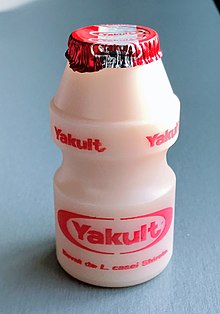
Probiotics are live microorganisms promoted with claims that they provide health benefits when consumed, generally by improving or restoring the gut microbiota.[1][2] Probiotics are considered generally safe to consume, but may cause bacteria-host interactions and unwanted side effects in rare cases.[3][4][5] There is some evidence that probiotics are beneficial for some conditions, such as helping to ease some symptoms of irritable bowel syndrome (IBS). However, many claimed health benefits, such as treating eczema, lack substantial scientific support.[1]
The first discovered probiotic was a certain strain of bacillus in Bulgarian yoghurt, called Lactobacillus bulgaricus. The discovery was made in 1905 by Bulgarian physician and microbiologist Stamen Grigorov. The modern-day theory is generally attributed to Russian Nobel laureate Élie Metchnikoff, who postulated around 1907 that yoghurt-consuming Bulgarian peasants lived longer.[6]
A growing probiotics market has led to the need for stricter requirements for scientific substantiation of putative benefits conferred by microorganisms claimed to be probiotic.[7] Although some evidence claimed benefits are marketed towards using probiotic, such as reducing gastrointestinal discomfort, improving immune health,[8] relieving constipation, or avoiding the common cold, such claims are strain-specific and cannot be extrapolated to other strains.[7][9][10] As of 2019, numerous applications for approval of health claims by European manufacturers of probiotic dietary supplements have been rejected by the European Food Safety Authority for insufficient evidence of beneficial mechanism or efficacy.[8][11]
- ^ a b "Probiotics". National Health Service. November 27, 2018. Archived from the original on April 20, 2021. Retrieved November 2, 2019.
- ^ "Probiotics: What You Need To Know". National Center for Complementary and Integrative Health, US National Institutes of Health. August 1, 2019. Archived from the original on September 17, 2018. Retrieved November 10, 2019.
- ^ Doron S, Snydman DR (2015). "Risk and safety of probiotics". Clin Infect Dis (Review). 60 (Suppl 2): S129–234. doi:10.1093/cid/civ085. PMC 4490230. PMID 25922398.
- ^ Singhi SC, Kumar S (2016). "Probiotics in critically ill children". F1000Res (Review). 5: 407. doi:10.12688/f1000research.7630.1. PMC 4813632. PMID 27081478.
- ^ Durchschein F, Petritsch W, Hammer HF (2016). "Diet therapy for inflammatory bowel diseases: The established and the new". World J Gastroenterol (Review). 22 (7): 2179–2194. doi:10.3748/wjg.v22.i7.2179. PMC 4734995. PMID 26900283.
- ^ Brown AC, Valiere A (January 1, 2004). "Probiotics and Medical Nutrition Therapy". Nutrition in Clinical Care. 7 (2): 56–68. ISSN 1096-6781. PMC 1482314. PMID 15481739.
- ^ a b Rijkers GT, de Vos WM, Brummer RJ, et al. (2011). "Health benefits and health claims of probiotics: Bridging science and marketing". British Journal of Nutrition. 106 (9): 1291–1296. doi:10.1017/S000711451100287X. PMID 21861940.
- ^ a b Turck D, Castenmiller J, De Henauw S, et al. (April 15, 2019). "Nutrimune and immune defence against pathogens in the gastrointestinal and upper respiratory tracts: evaluation of a health claim pursuant to Article 14 of Regulation (EC) No 1924/2006". EFSA Journal. 17 (4). European Food Safety Authority, Panel on Nutrition, Novel Foods and Food Allergens: e05656. doi:10.2903/j.efsa.2019.5656. PMC 7009160. PMID 32626282.
- ^ Slashinski MJ, McCurdy SA, Achenbaum LS, et al. (2012). "'Snake-oil,' 'quack medicine,' and 'industrially cultured organisms:' biovalue and the commercialization of human microbiome research". BMC Medical Ethics. 13: 28. doi:10.1186/1472-6939-13-28. PMC 3512494. PMID 23110633.
- ^ Engle MK, Roosevelt MW, Waltrip EA (November 22, 2011). "Warning letter to CocoKefir LLC". Compliance Branch, Inspections, Compliance, Enforcement, and Criminal Investigations, US Food and Drug Administration and Federal Trade Commission. Archived from the original on October 23, 2016. Retrieved June 4, 2016.
{{cite web}}: CS1 maint: bot: original URL status unknown (link) - ^ Chu W (April 18, 2019). "Heinz reels from latest probiotic health claim rejection by EFSA". NutraIngredients.com, William Reed Business Media Ltd. Archived from the original on October 20, 2020. Retrieved May 11, 2019.